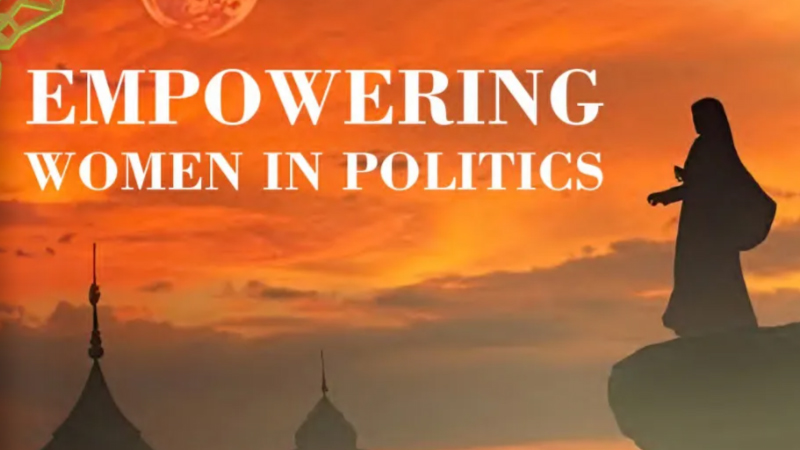Introduction:
In the ever-evolving landscape of politics, women have emerged as powerful agents of change, challenging traditional norms, and reshaping the future of governance. To fully appreciate the historical roots of women's active participation in politics, we turn to the 7th-century Arabia during the time of Prophet Muhammad SAWW. In this comprehensive exploration, we will delve into the historical context, women's active participation, challenges faced, triumphs achieved, the contemporary impact, and the ongoing call for gender equality in politics.
Historical Context:
7th-century Arabia was characterized by tribal societies with deeply entrenched patriarchal norms. The advent of Islam, however, brought about transformative changes, challenging prevailing norms and advocating for the rights and dignity of women. Prophet Muhammad SAWW's teachings emphasized the equality of men and women, providing a foundation for women's participation in various aspects of life, including politics.
The Quran itself underscores the importance of women as active contributors to society, recognizing their intellectual and moral capacities. Islam's emphasis on justice, compassion, and equality set the stage for women to play pivotal roles in shaping the nascent Muslim community.
Women's Active Participation:
A remarkable example of women's active participation during this era is Umm Waraqah, a companion of Prophet Muhammad SAWW known for her scholarly pursuits. Notably, she was appointed by the Prophet himself to lead prayers at her home, signifying not only her leadership in religious matters but also the acknowledgment of women in roles traditionally reserved for men.
Aisha bint Abi Bakr, the wife of Prophet Muhammad SAWW, was not only a spiritual leader but also a political figure. Her involvement in political discussions and her role in significant events, such as the Battle of the Camel and the Battle of Uhud, showcased her strategic acumen and political influence. Aisha's contributions laid the foundation for recognizing and respecting women's intellectual and political capacities.
Challenges and Triumphs:
While the time of Prophet Muhammad SAWW witnessed groundbreaking steps toward women's empowerment, challenges persisted. The broader cultural norms of 7th-century Arabia influenced societal attitudes towards women. However, the Prophet's teachings and actions set a precedent, emphasizing the importance of women's voices and contributions in shaping the community.
Fast forwarding to the 21st century, women in politics continue to face challenges, mirroring those faced by their predecessors. The struggles and triumphs of women in early Islamic history serve as an enduring source of inspiration, highlighting the ongoing need for gender equality in political arenas worldwide.
The Contemporary Impact:
The historical contributions of women during the time of Prophet Muhammad SAWW have had a lasting impact on the empowerment of women in the Islamic world and beyond. The recognition of women's leadership in religious, social, and political spheres laid the groundwork for future generations of women to actively participate in governance.
Today, women in politics stand on the shoulders of those who came before them, drawing inspiration from the pioneering examples set during
the time of Prophet Muhammad SAWW. Countries with predominantly Muslim populations have seen women rise to prominent political positions, challenging stereotypes and reshaping political landscapes.
The Call for Gender Equality in Politics:
To foster a truly inclusive political landscape, it is essential to draw upon the teachings of Prophet Muhammad SAWW and the early examples of women's participation in politics. This includes promoting equal representation in elected offices, dismantling gender stereotypes, and creating supportive environments that encourage women to enter and thrive in politics.
Educational initiatives and mentorship programs play a pivotal role in nurturing the next generation of female leaders. By equipping women with the tools and knowledge needed to navigate the political sphere, we can create a pipeline of empowered individuals ready to shape the future of governance.
Contemporary Challenges and Opportunities:
Despite the progress made, contemporary women in politics face multifaceted challenges, including gender bias, stereotyping, and unequal representation. The scrutiny of women's personal lives and appearances often overshadows their accomplishments and policies, mirroring challenges faced during the time of Prophet Muhammad SAWW.
However, the 21st century has also witnessed numerous triumphs, with women holding key political offices globally. Leaders such as Angela Merkel, Jacinda Ardern, and Kamala Harris showcase the diverse ways in which women contribute to governance and societal progress.
Global Perspectives on Women in Politics:
Taking a global perspective, various countries have implemented policies to enhance women's representation in politics. Quota systems, gender-sensitive legislation, and affirmative action measures aim to bridge the gender gap in political leadership. Examining these initiatives provides
insights into the diverse strategies employed to encourage women's active participation.
The experiences of women in different regions, such as the Middle East, Asia, Europe, and the Americas, reveal the complex intersections of culture, religion, and political systems in shaping women's roles in politics. Analyzing these global perspectives sheds light on the importance of tailoring strategies to each cultural and political context.
Grassroots Movements and Women's Empowerment:
Beyond formal political structures, grassroots movements have played a crucial role in advancing women's empowerment. Women-led movements advocating for social justice, equality, and human rights have gained momentum globally. Examining the impact of these movements offers valuable insights into the ways women mobilize for change, transcending political boundaries.
Moreover, women's involvement in non-governmental organizations (NGOs) and civil society has become instrumental in addressing social issues and influencing policy. By actively participating in these spheres, women contribute to shaping public opinion, influencing policy agendas, and fostering community development.
Intersectionality and Inclusivity:
An inclusive approach to women's participation in politics requires acknowledging and addressing intersectionality—the interconnected nature of social categorizations such as gender, race, class, and ethnicity. Recognizing the unique challenges faced by women with intersecting identities ensures that policies and initiatives are inclusive and equitable.
In contemporary politics, the voices of marginalized women, including those from indigenous communities, ethnic minorities, and LGBTQ+ individuals, are crucial for crafting policies that reflect the diverse needs of societies. Examining intersectionality provides a comprehensive understanding of the challenges and opportunities for women in politics.
Education, Mentorship, and Leadership Development:
Education remains a cornerstone for empowering women in politics. Access to quality education equips women with the knowledge and skills
needed to navigate the complexities of political leadership. Initiatives that promote education for girls and women contribute to breaking down systemic barriers and fostering a culture of inclusivity.
Mentorship programs are essential for nurturing the next generation of female leaders. Women who have succeeded in politics can serve as mentors, providing guidance, support, and valuable insights to aspiring leaders. Leadership development programs tailored to women's needs help build confidence, resilience, and strategic thinking.
The Role of Media in Shaping Perceptions:
The media plays a pivotal role in shaping public perceptions of women in politics. Analyzing media portrayals, both historical and contemporary, provides insights into the ways women are represented and how these representations influence public opinion. Media literacy programs are crucial for promoting accurate and fair portrayals of women in political leadership.
Moreover, social media platforms offer women politicians direct avenues to communicate with the public, share their narratives, and build support. Examining the evolving dynamics of media and its impact on women in politics sheds light on the challenges and opportunities in shaping public discourse.
Legal Frameworks and Policy Advocacy:
The existence of supportive legal frameworks is integral to fostering women's participation in politics. Analyzing the effectiveness of gender-sensitive legislation, such as electoral quotas and anti-discrimination laws, provides insights into the impact of legal mechanisms on women's representation. Advocacy for policy reforms and the enforcement of existing laws contribute to creating an environment that encourages women to enter politics and ensures their fair treatment.
Furthermore, international organizations and women's rights advocates play a crucial role in shaping global norms and influencing national policies. Examining the collaboration between governments, non-
governmental organizations, and international bodies offers a comprehensive view of the efforts to promote gender equality in political representation on a global scale.
Building Inclusive Political Institutions:
The structure of political institutions significantly influences women's participation in politics. Analyzing the impact of parliamentary systems, political party structures, and electoral processes on women's representation provides valuable insights. Examining successful case studies where institutional reforms have led to increased women's participation helps identify best practices and potential areas for improvement.
In addition to formal institutions, understanding the role of informal networks and support systems within political environments is crucial. Building inclusive political institutions requires a multifaceted approach that addresses both formal and informal aspects, fostering an environment where women can thrive and contribute meaningfully to political decision-making.
The Economic Empowerment of Women:
Economic empowerment is closely intertwined with political empowerment. Assessing the impact of economic policies, entrepreneurship opportunities, and access to resources on women's ability to engage in politics provides a holistic perspective. Economic independence not only enhances women's decision-making power but also strengthens their influence in shaping policies that address economic inequalities.
Supporting initiatives that promote women's economic empowerment, such as access to credit, vocational training, and entrepreneurship programs, contributes to creating a foundation for women to actively participate in politics and contribute to societal development.
The Road Ahead - Challenges and Opportunities:
While significant progress has been made, challenges persist on the road to achieving full gender equality in politics. Cultural norms, societal
expectations, and persistent gender biases continue to impede women's progress. Analyzing the evolving nature of these challenges provides insights into the nuanced barriers that women face and informs strategies for overcoming them.
Simultaneously, opportunities for women in politics are expanding. The increasing global recognition of the importance of women's perspectives in governance, coupled with the rise of grassroots movements and advocacy, presents opportunities for transformative change. Evaluating successful initiatives and identifying emerging trends provides a roadmap for future efforts to advance women's roles in political leadership.
Conclusion:
In conclusion, the historical perspective from the time of Prophet Muhammad SAWW lays a strong foundation for understanding the empowering role of women in politics. The examples set by Umm Waraqah and Aisha bint Abi Bakr underscore the potential and capabilities of women in political leadership. The challenges and triumphs of women in early Islamic history serve as a beacon for contemporary efforts to achieve gender equality in politics globally.
As we navigate the complex terrain of the 21st century, it is essential to draw inspiration from historical precedents while addressing current challenges. By promoting education, mentorship, legal reforms, economic empowerment, and inclusive institutional structures, we can create an environment where women's voices are heard, respected, and valued in political decision-making.
The road ahead requires concerted efforts from governments, civil society, international organizations, and individuals to dismantle systemic barriers and foster a culture of inclusivity. Women in politics are not only leaders; they are architects of a more equitable and just world. The journey towards gender equality in politics is ongoing, and by learning from the past and embracing the opportunities of the present, we can collectively shape a future where women stand on equal footing with their male counterparts, influencing policies that reflect the diverse needs of our societies.


